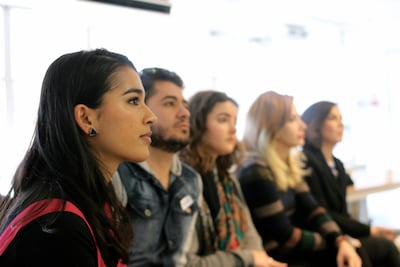Kabul-born Mursal Hedayat knows first hand the difficulties facing refugees entering the workforce in their host countries.
She arrived in the UK as a child with her mother, who was a civil engineer in their native Afghanistan but worked as a cleaner for nearly a decade before she became a successful language teacher.
War in Syria turned millions of people around the world into refugees and Ms Hedayat tapped into her mother’s experiences – her “ultimate inspiration” – to launch Chatterbox.
The online language school trains and employs refugees as teachers.
“Our initial inspiration was an existing route out of underemployment that a lot of refugees were already taking advantage of,” she tells The National.
“In being denied the ability to use their previous qualifications and work experience to continue working, a lot of refugees like my mum and Chatterbox’s first-ever language coach, who was a dentist from Syria, had understood that their language skills still carried market value and started using it to gain work online.”
Founded in 2016 by Ms Hedayat and Y Combinator alumna Guillemette Dejean, Chatterbox has been backed by British, European and Silicon Valley investors and has just raised £1.5 million ($1.97 million) pre-seed investment to expand its services.

While the start-up’s initial focus was to help Syrians, Ms Hedayat says repeated waves of refugee crises makes it “hard to pinpoint exactly what inspires our team to do the work they do every day” but that building a scalable solution to directly benefit marginalised communities has always been her vision.
Six years on, the tech social enterprise has grown to include refugees from Venezuela, Cuba, West Africa and the Middle East.
It also now supports native people who have been affected by changes in industries caused by Covid and marginalised groups who find it difficult to get back into work.
“Namely a lot of women who are returning to work after career breaks and older workers who have had their careers impacted by Covid,” says Ms Hedayat, who was awarded an MBE in 2021 for services to social enterprise, technology and the economy.
Chatterbox’s AI-powered technology gives people with language skills the tools to become teachers on their own.
“So in the same way that Uber has made it possible for anyone with a car and driving skills to become, you know, a transport entrepreneur, Chatterbox has made it so that anyone who is eloquent and has a language skill can monetise that skill using our technology.”
The tech business works with corporate clients, including Unilever, PwC and the British Red Cross, directing “the unharnessed talents” that they have trained their way.
As you would expect of any award-winning entrepreneur, Ms Hedayat is enthusiastic boasts about their “amazing” product and says clients have not only extended their contracts with Chatterbox, but expanded them.
“Part of the AI involves algorithmically matching language coaches with learners based on their professional backgrounds and interests to create incredible matches.
"One of the matches that I’m most proud of was the chief science officer for the UK Department for International Development who was learning French with us before being deployed to West Africa to aid in the Ebola crisis and she was matched with a West African doctor to learn French. These are the matches that are possible because we are harnessing talent with experience in industry using technology,” Ms Hedayat says.
While her business was born out of empathy, Ms Hedayat says she is “a huge realist” who does not believe in charity as the main model for social change. Chatterbox’s unique selling point is that it “adds value to the overall learning experience, rather than being tokenistic”.
“In no other product would people be able to be matched with language coaches who share their personal and professional interests, who come from often really exceptional professional backgrounds: medical doctors, business leaders, artists and actresses, scientists.
“Fundamentally, a lot of people don’t have visibility to the wealth of talent that exists within these communities. And our advantage has been believing that it exists and finding it and then building this product that is strengthened by the incredible quality and really inspirational professional backgrounds of our coaches.”
It helps that Chatterbox’s services fit neatly into companies’ increasing interest in touting their own environmental and social governance pillars.
“And we do ESG in a very direct, tangible and business-aligned way,” she says.
“I think that Chatterbox’s systemic impact will happen when people appreciate just how much talent is going to waste today.”
Their latest round of investment will allow Chatterbox to develop its diversity as a service beyond language skills and identify additional ways to help communities break into jobs online.
“We have a deep belief that the online tech world is the new gold. It’s where the most jobs are being created, the most economic value is and the most demand for talent is and this is a sector that marginalised communities wouldn’t normally think of as being for them.”
With the Great Resignation spurring a “huge war for talent”, particularly in the technology sector, Chatterbox is primed to push forward with its mission of connecting talented but marginalised people with growing opportunities in the digital economy.
“Instead of directing refugees towards service jobs or jobs in supermarkets … they could form a huge part of the future workforce for the tech companies and the online industry that are emerging.”


